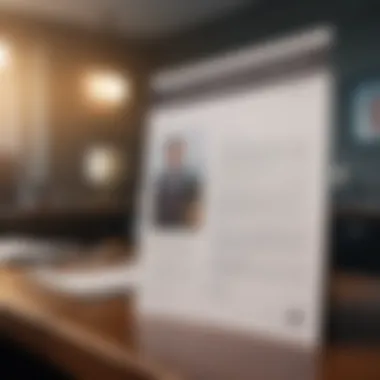Crafting an Impressive Cover Letter: Mastering the Art of Standout Applications


Understanding Personal Finances
In the realm of crafting an impressive cover letter and securing the ideal job, understanding personal finances plays a crucial role. Budgeting techniques serve as the cornerstone of financial management, aiding individuals in allocating their resources efficiently. Tracking expenses meticulously is paramount to gain insights into spending patterns and identify areas for potential savings. Moreover, setting financial goals forms the roadmap towards achieving monetary milestones, whether in career advancement or personal pursuits.
Investing Strategies
As young professionals seeking to make a mark in their careers, an introduction to investing is essential. Exploring risk management tactics is indispensable to safeguard hard-earned capital amidst the volatile financial landscape. Diversification emerges as a key strategy to spread investment risk and optimize potential returns, aligning with long-term financial objectives.
Retirement Planning
A prudent approach towards retirement savings plans is imperative for financial stability in the golden years. Understanding social security benefits provides insights into additional income sources during retirement. Moreover, evaluating healthcare costs and factoring them into retirement planning ensures comprehensive financial security post-employment.
Financial Products Overview
Delving into the types of investment vehicles unveils a plethora of options catering to varied risk appetites and return expectations. Establishing financial literacy around savings accounts enables the accumulation of emergency funds and future investments. Additionally, comprehending the nuances of credit cards and loans aids in prudent financial management, avoiding debt traps and maintaining a healthy credit profile.
Expert Insights and Tips
Gleaning from financial advisor recommendations imparts valuable guidance on wealth management and investment strategies. Analyzing market trends equips individuals with foresight to capitalize on lucrative opportunities and mitigate potential risks. Furthermore, implementing tax planning strategies optimizes financial outcomes, ensuring tax efficiency and maximizing savings for future endeavors.
Intro
In this highly competitive job market, mastering the art of creating an outstanding cover letter is essential. A well-crafted cover letter not only showcases your skills and experiences but also sets you apart from other applicants. This article delves into the intricacies of crafting a captivating cover letter that grabs the attention of potential employers. From setting the right tone to highlighting your unique skills, each aspect is meticulously explored to help you secure your dream job.
Setting the Tone
Begin with a Strong Opening
Initiating your cover letter with a compelling opening sets the tone for the rest of the document. A strong opening immediately captures the reader's attention and entices them to continue reading. By starting with a decisive statement or an intriguing question relevant to the position, you can make a memorable first impression. This approach demonstrates your enthusiasm and seriousness about the opportunity, which can be highly appealing to recruiters.
Personalize Your Approach
Personalizing your cover letter by addressing the hiring manager by name shows that you have taken the time to research the company and are genuinely interested in the role. Tailoring your content to the specific job requirements and company culture helps create a connection with the reader. It also gives you the chance to emphasize how your unique background aligns with the organization's goals, making you a standout candidate.
Show Enthusiasm and Confidence
Infusing your cover letter with enthusiasm and confidence can significantly impact how it is received. Expressing genuine excitement about the opportunity and illustrating your confidence in your abilities convinces employers of your potential value to their team. However, striking the right balance between enthusiasm and professionalism is crucial to convey your passion while remaining composed and credible.


Highlighting Your Skills
Align Skills with Job Requirements
Aligning your skills with the job requirements outlined in the job description is vital for demonstrating your suitability for the position. By showcasing how your abilities directly meet the employer's needs, you present yourself as a qualified candidate. Drawing parallels between your experiences and the desired qualifications helps recruiters envision how you can contribute to their organization's success.
Quantify Achievements
Quantifying your achievements using specific metrics or statistics adds credibility to your claims and provides tangible evidence of your capabilities. By quantifying the results of your past accomplishments, you showcase your impact and competency in a quantifiable manner. This approach helps recruiters gauge the scale of your achievements and understand the value you can bring to the role.
Use Specific Examples
Supporting your skills with concrete examples from your professional experiences reinforces your credibility and offers context to your claims. By narrating specific instances where you successfully applied your skills to achieve results, you paint a vivid picture of your capabilities. Using relevant examples that directly relate to the job requirements helps recruiters visualize how your past experiences make you a suitable candidate.
Demonstrating Research
Mention Company Insights
Referencing specific insights about the company in your cover letter demonstrates your keen interest and dedication to the application. Incorporating details about the company's recent accomplishments, projects, or values showcases your preparation and genuine interest in becoming part of their team. It also highlights your cultural fit and alignment with the organization's mission.
Cite Relevant Projects
Citing relevant projects you have worked on that align with the company's industry or challenges showcases your understanding of the job requirements. By linking your past projects to potential solutions for the company's current needs, you exhibit your proactive approach and problem-solving skills. This demonstrates to recruiters that you have the relevant experience to tackle the challenges they are facing.
Show Industry Awareness
Demonstrating your awareness of industry trends and challenges positions you as a knowledgeable and forward-thinking candidate. By referencing industry-specific developments, news, or best practices in your cover letter, you convey your interest in staying informed and adapting to changes. This not only showcases your professionalism but also highlights your potential contributions to the organization's growth.
Body of the Cover Letter
Crafting an impressive cover letter is a pivotal aspect of any job application process. It serves as the initial point of contact between you and a potential employer, providing an opportunity to showcase your qualifications, skills, and enthusiasm for the job position. In this article, the body of the cover letter is dissected into various subtopics that focus on different elements crucial for creating a compelling cover letter.
Expressing Passion
Connect Personal Passion to Role
When it comes to expressing passion in a cover letter, linking your personal interests to the role you are applying for can significantly elevate your application. By demonstrating a genuine connection between what motivates you on a personal level and how it aligns with the responsibilities of the job, you not only show authenticity but also indicate a strong fit for the position. Incorporating this alignment can make your cover letter more convincing and memorable.
Explain Career Motivations


Explaining your career motivations in a cover letter helps the reader understand the drive behind your professional choices. By articulating the reasons why you are pursuing a particular career path or applying for a specific job, you provide context for your aspirations and goals. This transparency can establish credibility and convey a sense of purpose, which are qualities that employers often seek in potential candidates.
Emphasize Long-Term Goals
Emphasizing your long-term goals in a cover letter demonstrates foresight and commitment. It shows that you have thought strategically about your career trajectory and how the current opportunity fits into your broader ambitions. By highlighting your aspirations for the future and indicating how the position you are applying for plays a role in achieving those goals, you present yourself as a forward-thinking and motivated individual.
Addressing Company Needs
Identify Company Pain Points
Identifying and addressing company pain points in your cover letter can set you apart as a thoughtful and proactive candidate. By showing that you understand the challenges or issues the company may be facing, you demonstrate your ability to empathize with their situation and offer relevant solutions. This not only highlights your problem-solving skills but also underscores your genuine interest in contributing to the organization's success.
Offer Solutions
Offering solutions in your cover letter exhibits your problem-solving skills and initiative. By presenting specific ways in which you can add value to the company or help overcome its challenges, you showcase your proactive approach to problem-solving. This proactive stance can capture the attention of employers and position you as a candidate who is not just aware of issues but also ready to take action.
Provide Value Proposition
Presenting a compelling value proposition in your cover letter is crucial for attracting the employer's interest. By clearly communicating the unique benefits and contributions you bring to the table, you make a strong case for why you are the ideal candidate for the job. Articulating your value proposition effectively can differentiate you from other applicants and leave a lasting impression on the reader.
Crafting a Compelling Narrative
Tell a Story with Impact
Telling a story with impact in your cover letter can make you more memorable to hiring managers. By narrating a relevant experience or achievement that showcases your skills and character, you create a vivid picture of your potential contributions. Crafting a narrative that resonates emotionally and intellectually with the reader can make your cover letter stand out and leave a lasting impression.
Create a Memorable Closing
Creating a memorable closing for your cover letter is essential for leaving a positive final impression. The closing paragraph should summarize your key strengths and reiterate your enthusiasm for the role. By ending on a strong and upbeat note, you can reinforce your interest in the position and leave the reader with a sense of your professional demeanor.
Ensure Clarity and Conciseness
Ensuring clarity and conciseness in your cover letter is paramount for effective communication. A well-structured and easily understandable cover letter not only conveys professionalism but also respects the reader's time. By organizing your thoughts logically and expressing them concisely, you can deliver a clear and compelling message that captures the employer's attention.
Closing the Cover Letter
Crafting an effective cover letter is not merely about introducing yourself and showcasing your skills. It extends to the pivotal phase of closing the letter. This final section plays a crucial role in leaving a lasting impression on the hiring manager. By wrapping up your correspondence adeptly, you reinforce your interest in the position and gratitude for the reader's time and consideration. Expressing gratitude at the conclusion of your cover letter is more than a formality; it displays professionalism and courtesy. It shows that you value the opportunity and appreciate the reader's attention to your application. A gracious tone can serve as the final touch that sets you apart from other candidates.


Expressing Gratitude
Thank the Reader
In the realm of cover letter writing, expressing thanks can elevate your communication to a higher standard. Thanking the reader demonstrates good manners and acknowledges the recipient's role in the hiring process. It signifies that you understand the time and effort invested in reviewing applications. A genuine 'thank you' can resonate with the reader, leaving a positive impression. By appreciating the opportunity to apply and thanking the reader for considering your candidacy, you create a sense of respect and courtesy in your communication.
Reiterate Interest
Reiterating your interest in the position reinforces your enthusiasm and commitment. It affirms your desire to contribute to the organization and emphasizes your keenness to take on the responsibilities of the role. By restating your motivation for the position, you remind the reader of your passion and dedication. This step can subtly emphasize why you are a strong fit for the job and align your goals with the company's mission.
Encourage Further Contact
Encouraging further contact is a proactive approach that demonstrates your openness to communication. By inviting the reader to reach out for additional discussions or interviews, you show eagerness and availability. This proactive stance can leave a positive impression and indicate your willingness to engage in further dialogue. It opens the door for continued interaction and reinforces your interest in moving forward in the selection process.
Polishing Your Presentation
In the competitive landscape of job applications, attention to detail in presenting your cover letter is paramount. Polishing your presentation ensures that your document makes a strong visual and linguistic impact. This section addresses the finer points of refining your cover letter to convey professionalism and meticulousness. From ensuring error-free text to formatting consistency, each element contributes to a polished final product.
Check for Spelling and Grammar
The significance of impeccable spelling and grammar cannot be overstated in a cover letter. An error-free document reflects your attention to detail and your commitment to high standards. Typos or grammatical mistakes can detract from your credibility and professionalism. By meticulously reviewing your cover letter for language accuracy, you present yourself as a diligent and conscientious candidate.
Ensure Proper Formatting
Proper formatting enhances the visual appeal and readability of your cover letter. Consistent formatting throughout the document creates a polished and structured appearance. A well-organized layout demonstrates your ability to present information clearly and effectively. Properly formatted content enables easy navigation for the reader and showcases your proficiency in document layout.
Seek Feedback
Seeking feedback on your cover letter can provide valuable insights and perspectives. External feedback can help you identify areas for improvement and refine your content further. By seeking input from mentors, peers, or professionals in the field, you gain valuable guidance on enhancing your communication. Constructive criticism can highlight blind spots and offer suggestions for strengthening your cover letter's impact.
Final Touches
The final touches of your cover letter serve as the ultimate steps in refining your application. These crucial elements contribute to a comprehensive and polished presentation, leaving a lasting impression on the reader. Attention to detail in signing off professionally, providing contact information, and avoiding common pitfalls can bolster the overall effectiveness of your cover letter.
Sign Off Professionally
The closing salutation of your cover letter signifies the end of your communication and should be executed professionally. A well-chosen sign-off reflects your tone and demeanor, whether formal or more casual. It is important to select a closing remark that aligns with the overall tone of your letter and leaves a positive final impression on the reader.
Add Contact Information
Including your contact information ensures that the reader can easily reach out to you for further correspondence. Providing clear and accurate contact details is essential for facilitating communication between you and the hiring team. By including this information, you demonstrate readiness and accessibility for potential interviews or discussions.
Avoid Common Pitfalls
Identifying and avoiding common pitfalls in cover letter writing is fundamental to presenting yourself effectively. Common errors such as vague language, overly complex sentences, or lack of customization can hinder the impact of your cover letter. By being aware of these pitfalls and taking measures to steer clear of them, you can enhance the overall quality and effectiveness of your application.







